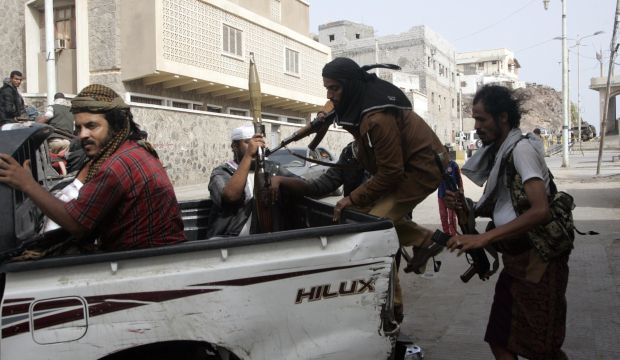
Militiamen loyal to Yemen’s President Abd Rabbuh Mansur Hadi ride a vehicle outside the Republican Palace in Aden, Yemen, on February 25, 2015. (Reuters/Yaser Hasan)
Sana’a, Asharq Al-Awsat—Yemeni President Abd Rabbuh Mansur Hadi is seeking to have international aid transferred from the capital Sana’a, where Houthi rebels hold sway, to his new southern stronghold in Aden, Asharq Al-Awsat has learned.
Speaking to Asharq Al-Awsat on the condition of anonymity, a Yemeni government source said President Hadi is trying to have international aid transferred to the Central Bank of Aden, which operates independently of the Iran-backed rulers of Sana’a, in a bid to fund his government in the south.
After fleeing Houthi-held Sana’a in late February, the embattled president has faced the tough task of negotiating with the political and tribal leaders of Aden to form a government and secure the necessary funds to run state affairs in the southern port city.
“Hadi has set up a mini working group of former ministers and officials as well as military commanders and advisers to run the daily affairs [of Aden],” the official said.
“It resembles an undeclared mini government.”
“For the time being, [President Hadi] is avoiding the naming of a government to officially run the affairs of the country as he is waiting for the picture to become clearer in terms of what the [UN-sponsored] political dialogue will lead to,” he said.
Another issue delaying Hadi’s announcement of a new government, the source maintained, is the house arrest imposed on PM Khaled Bahah by the Houthis in the capital.
But according to the official, Hadi “will not wait long [as] he has started to sense the need to strengthen his [leadership] in Aden as shown by the recent appointments he announced in the security apparatus.”
Hadi is seeking to restore control over the national army and security apparatus as an initial step towards strengthening his control over southern parts of Yemen.
In comments to Asharq Al-Awsat, a prominent tribal leader from the strategic Ma’rib province said: “[Hadi] is dismantling the state of former president Ali Abdullah Saleh in the south in order to establish his government first in the south and then in the north.”
After being let down by the Americans and the British, the sheikh said, “Hadi is betting on the Saudis and the Gulf as their interests require that they commit to the legitimacy of the state in the face of the legitimacy of weapons and Iranian intervention.”
Cracks began to appear within the ruling General People’s Congress (GPC) party after Saleh, its leader, sacked Hadi following international sanctions imposed on him and the Houthis in late 2014.
“[Hadi] is fighting a war with Saleh to restore the GPC and the party has begun to split into two wings: That of Hadi which will include the regions of Aden, Hadhramaut and Saba and that of Saleh which covers the regions of Azal, Jund and Tihamah,” the sheikh added.
“[The president] is avoiding a confrontation with the Houthis. If possible, a settlement, led by him, would see him in partnership [with the Houthis] again without militias in Sana’a.”
However, Hadi’s efforts may face complications as the main southern secessionist group, the Al-Hirak movement, seeks to gain full independence from Sana’a.
“Al-Hirak’s leaders are looking cautiously to Hadi’s actions . . . and do not intend to stir the street against him unless he fails to adopt the southern cause,” a prominent Al-Hirak leader, Brig. Gen. Ali Mohammed Al-Saadi, told Asharq Al-Awsat.
“Hadi faces a very complex political situation and I do not think he has the key to solving it,” he added.
